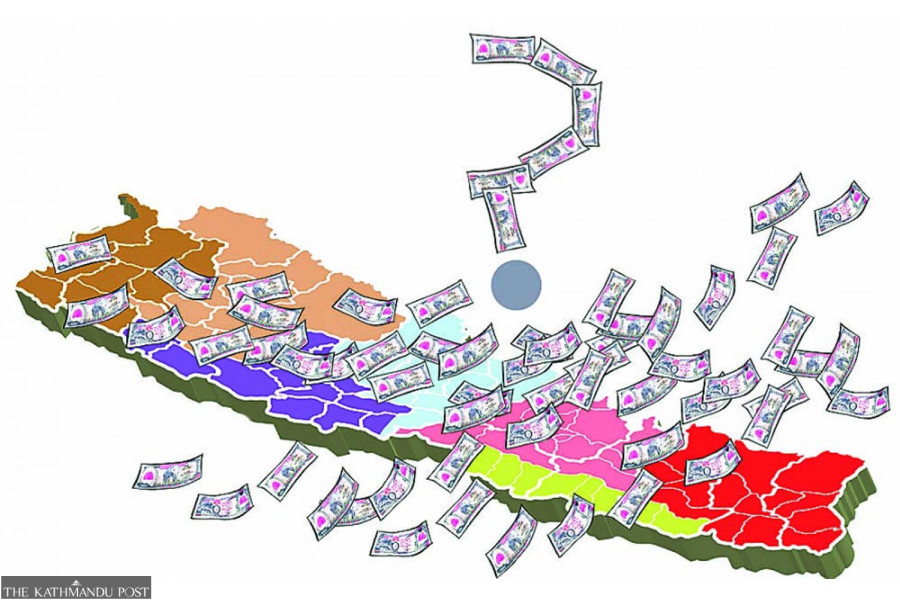National
Kathmandu could cut funds to provinces and local governments
Provinces were supposed to get nearly Rs130 billion and local governments Rs300 billion in fiscal transfers.
Prithvi Man Shrestha
The federal government has indicated that it could struggle even to provide committed resources to the provincial and local governments due to the resource crunch amid falling revenues.
Any cut in fiscal transfer from the central government may prevent sub-national governments from implementing several budgetary programs. Currently, both provincial and local governments are heavily reliant on fiscal transfers from the centre to implement their budgetary programs.
The federal government had promised a fiscal transfer of Rs129.46 billion for seven provincial governments and Rs300.37 billion for 554 local governments when the budget for the current fiscal year was presented on May 29 last year.
As per the budgetary provision, the central government is supposed to provide these committed funds under four headings—equalisation grants, conditional grants, complementary grants, and special grants. The provinces and local governments are supposed to get an additional Rs163 billion through a revenue-sharing mechanism as well.
However, the Finance Ministry said in a press statement on Tuesday that it has to manage extra resources to ensure payment of compulsory liabilities of the provincial and local governments due to a fall in revenue collection.
As of January-end of the current fiscal year 2022-23, the government’s revenue collection stood at Rs477.73 billion, which is less than Rs571.55 billion collected during the same period last fiscal year, according to the Financial Comptroller General Office (FCGO).
The revenue collected so far this fiscal year is not enough even to sustain the recurrent expenditure of the federal government which stood at Rs494.67 billion as of January 31, the FCGO data show.
Pointing out the dismal resource availability, the Finance Ministry has warned sub-national governments about future budget cuts. The ministry also called on both sub-national governments to cut down on their expenditure (except on compulsory liabilities) by 20 percent.
“[It is only natural that] provincial and local governments should also feel the pressure of resource crunch the central government is currently facing,” said Ritesh Shakya, chief of the budget division at the Finance Ministry.
When asked if the central government would reduce the next fiscal transfer to sub-national governments, Shakya was unsure.
As per the Appropriation Act-2022, the federal government is supposed to make fiscal transfers in four instalments—on Bhadra 2 (August 18), on Kartik 2 (October 19), on Magh 2 (January 16), and on Baishakh 2 (April 15)—to sub-national governments.
According to the Finance Ministry, its treasury has become negative by Rs90 billion.
Officials at federal and sub-national governments said it was for the first time that the federal government indicated its inability to provide promised funds to sub-national governments.
The Finance Ministry said that reduced revenue collection, rising costs for salary, pension, and social security, timely unavailability of budget support from donors, and increased cost of domestic and external loans are putting pressure on the government’s resources.
The federal government’s appeal to introduce cost-cutting measures has reached sub-national governments.
“We received the request of the federal government to reduce administrative spending on Tuesday evening and we are now discussing how we can cut expenditures on non-compulsory liabilities,” said Shiva Kumar Karki, secretary at the Ministry of Economic Affairs and Planning of Province 1.
Provincial and local governments, however, said that no federal government in the past had reduced their budget. Karki said the central government might only have issued a warning. Province 1 has been promised a fiscal transfer of Rs19.09 billion in the current fiscal year, according to the budgetary provision.
Bagmati province itself is going to take measures to cut administrative expenses. It has formed a committee headed by Mahesh Acharya, secretary at its Economic Affairs and Planning Ministry, to explore ways to reduce such expenses. “We are working on it and plan to submit a report by Sunday,” Acharya told the Post. The federal government has promised a fiscal transfer of Rs 20.32 billion for the Bagmati province in the current fiscal year.
Local governments are also aware that the federal government is facing resource crunch owing to poor revenue collection. They fear this could impact their own development projects.
“It will be difficult for us to scrap or downsize development projects,” said Bhim Prasad Dhungana, president of the Municipal Association of Nepal, a grouping of municipalities. “We will try our best to reduce administrative expenditures, but we want the federal government not to cut the budget meant for local development projects.”




 13.12°C Kathmandu
13.12°C Kathmandu














